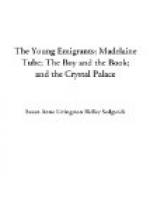Mr. Watson and Mr. Lee, now doubly connected through their children, sat together a little apart, recalling, as they talked, the various trials of their first experience of the wilderness, and comparing the present with the past.
“Who would have anticipated such a scene as this,” remarked the latter, “when you and Dick came to help us build the log-house?”
“And yet it has come to pass by most simple means,” replied Mr. Watson,—“industry and perseverance. These qualities, as we are now old enough to know, will gain a home and its comforts in any part of the world,—in our native land as well as here, although too many doubt the fact. Yet there are times when a man in the crowded communities of Europe sees no refuge but in emigration. When such is the case, he must make up his mind to leave behind the faults and the follies which have there hindered his well-being. If he cannot do this he will be as poor and discontented here as in England. You and I have reason, my friend, to be grateful that the Providence which guided us hither, gave us courage to bear patiently the dangers and privations which must be conquered before a home and prosperity can be won by the Emigrant.”
MADELAINE TUBE
and Her Blind Brother
A Christmas Story for Young People
[Illustration: “May God give you a happy Christmas.”]
CHAPTER I.
THE BROKEN CUP.
“Come! boys,” said Master Teuzer, a potter of Dresden, to his work people, who had just finished their breakfast, consisting of coffee and black bread, “Come! to work.”
He stood up; the work people did the same, and went into the adjoining work-shop, where each of them placed himself at a bench.
“Who is knocking at the door?” said the Master, interrupting the silence which reigned. “Come in there!” he added in a rough tone. The door opened, and a little girl entered, saluted him timidly, and remained standing on the threshold. The clock had not yet struck five, nevertheless the fair hair of the little girl, who was about ten years old, had already been nicely combed, and every part of her dress, although poor, was neat and in order, her cheeks and hands were of that rosy color which is produced by the habit of washing in cold water.
Master Teuzer observed all this with secret satisfaction, he looked kindly at the timid child. “Ah, my little one, so early, and already up, are you then of opinion that the morning is best for work? It is well, my child, and appears to agree with you—you are as fresh as a rose of the morning. Well; what have you brought me?”
The little girl took from her apron, which she held up, a china cup, broken into two pieces—“I only wished to ask you,” said she, in a sad voice, “if you can mend this cup so that the crack will not be seen.”




